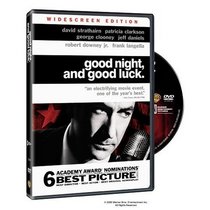| Format: DVD Number of Discs: 1 SwapaDVD Credits: 1 Total Copies: 19 Members Wishing: 0 |
Search - Good Night, Good Luck. on DVD
  | Good Night Good Luck * Actors: Robert John Burke, Patricia Clarkson, George Clooney, J.D. Cullum, Jeff Daniels — * Directors: George Clooney — * Format: AC-3, Closed-captioned, Color, Dolby, DVD-Video, Subtitled, Widescreen, NTSC — * Language: En... more » |
Larger Image |
Movie DetailsSimilar Movies
Similarly Requested DVDs
|
Movie ReviewsHistorical inaccuracies Michael W. Perry | Author of Untangling Tolkien, Seattle, WA | 12/09/2008 (3 out of 5 stars) "We all know that what Senator Joe McCarthy said in the 1950s about the communist threat facing America was filled with lies. But how many of us also know that much of what today's news and entertainment media says about the McCarthy Era is equally flawed? McCarthy died discredited in 1957, and his lies fortunately died with him. But the distortions that today's news media use to conceal their own misdeeds during that era remain with us. This film is an illustration of that. It's not only propaganda, it's poorly done and implausible propaganda.
The clue lies in this film's portrayal of McCarthy, a portrayal that has hardened into dogma among most professional journalists. Senator McCarthy, the film tells us, was such an immensely powerful figure that Edward R. Murrow, a journalist at CBS-TV, displayed great courage in talking him on in 1953. Does that make sense? In 1953, McCarthy was the junior senator from Wisconsin and had been in that office for only six years. It's not a position that carries with it much political power. Today, most Americans don't even know who holds that office and certainly wouldn't hesitate to criticize someone with so little power. In contrast, Murrow had been an internationally known and well-respected reporter since May of 1938, when he covered the German annexation of Austria for CBS radio. The American public had been hearing him for fifteen years and millions tuned into his TV show, "See It Now." Look at the numbers. McCarthy had been nationally known only since his Wheeling, West Virginia speech in February of 1950, a mere three years earlier. Three years or fifteen--who really had the most influence and power? Of course, that doesn't mean that McCarthy wasn't powerful or that no one need fear to tangle with him. Even President Eisenhower, who loathed McCarthy, was forced to bide his time, waiting for the senator to self-destruct. But McCarthy's power did not rest in who he was. It rested on what the national press had made out of him. That's the key to understanding why the media in this country has a vested interest in distorting the history of that era. It was they who had turned a politician with no particular talent and a propensity to lie into someone millions of Americans saw as a brave and honest opponent of communist infiltration into American life. If you want a historical parallel, think of former Vice-President Albert Gore and the millions who believe what he says about global warning. They eagerly follow his hints of dark conspiracies by oil companies. They want dissenting voices silenced, and our lives forcibly reorganized to remove what they think is a great danger. Former vice-presidents aren't that powerful. It's the media that gives Gore a platform from which to speak and rarely challenges what he says. The real problem isn't the fear-monger. It's a hysteria-prone press lacking in judgment. Substitute a communist conspiracy for one by oil companies and you have the McCarthy Era. It was created by the press and not McCarthy. That's what this film fails to point out. Murrow had to take a bold stand against McCarthy because for three years many hundred of reporters and news outlets had repeated what McCarthy said without critically examining it. Over and over, McCarthy made claims that did not stand up to close scrutiny. The closest this film comes to admitting that is in its oft-repeated statement that reporting the news should mean more than reporting what each side in a controversy was saying. I'll close with a brief look at the film as a film. It's the fifties, so be prepared for more smoking than you see in films set in the present. Murrow himself was heavy smoker who died in 1965 of lung cancer. Also, this film focuses almost exclusively on the world of CBS. The larger world only appears in brief flashes, typically on television monitors. --Michael W. Perry, editor of The School of Journalism in Columbia University: The Book That Transformed Journalism from a Trade into a Profession" |














